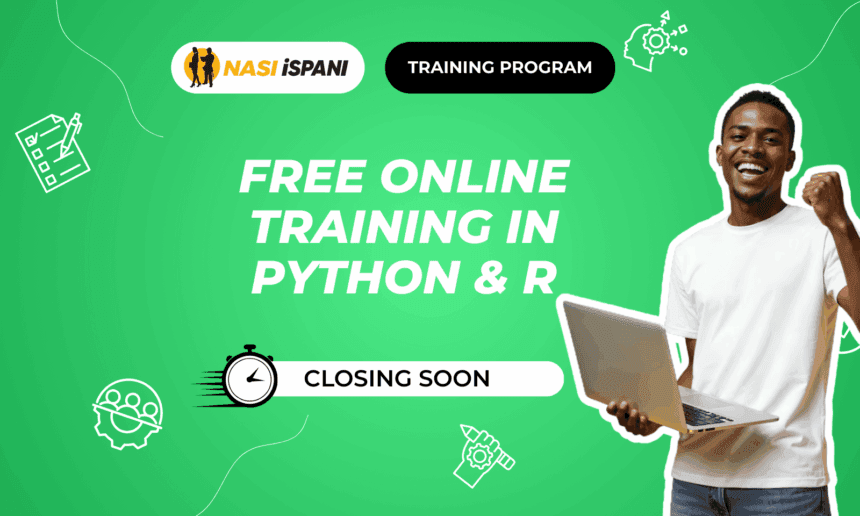If you’ve been looking for a simple way to start coding, this is it.
The South African Centre for Digital Language Resources (SADiLaR), through its ESCALATOR Programme, is offering free online training in Python and R for students and researchers in the humanities and social sciences.
This beginner-friendly 4-week course requires no prior coding experience and will guide you step-by-step in working with data, analysing information, and enhancing your research skills — all from the comfort of your home.
About the South African Centre for Digital Language Resources (SADiLaR)
The South African Centre for Digital Language Resources (SADiLaR) is a research infrastructure initiative funded by the Department of Science and Innovation (DSI) and hosted by North-West University. Its mission is to support and advance digital research in all of South Africa’s official languages, with a strong focus on providing tools, training, and resources that enable researchers to work effectively in the digital age.
The ESCALATOR Programme is one of SADiLaR’s flagship initiatives. It aims to grow a thriving, inclusive digital and computational research community in South Africa, particularly within the humanities and social sciences. Through workshops, training programmes, and community-building activities, ESCALATOR lowers the barriers to entry for digital research skills, making them accessible to people with no prior technical background.
By offering this free online training in Python and R, SADiLaR’s ESCALATOR Programme is helping students and researchers unlock new possibilities for data-driven research, collaboration, and innovation.
Training Dates, Format, and How It Works
This free online training in Python is part of a series of short courses designed to introduce you to programming basics and practical applications in research. Participants can choose between Python or R or apply for both if space allows.
Dates & Times:
- Python: Thursdays – 4, 11, 18 & 25 September (11:30–13:00)
- R: Fridays – 5, 12, 19 & 26 September (11:30–13:00)
Format: Virtual via Zoom
Group Size: Maximum 10 participants per track for personalised attention
Cost: 100% Free
You’ll learn in small, interactive groups with step-by-step guidance from experienced trainers. Each session builds on the previous one, making it easy to follow even if you’ve never written a single line of code before.
Why Python & R Matter in Humanities and Social Sciences
In the past, coding was seen as a skill reserved for computer scientists and engineers. Today, Python and R are transforming how research is done across all disciplines including the humanities and social sciences.
These programming languages allow researchers to work more efficiently, handle larger and more complex datasets, and gain deeper insights from their work.
Python is widely used for:
- Text analysis – processing books, articles, and social media content to identify themes and patterns
- Data cleaning and organisation – preparing raw information for analysis
- Automation – saving time by automating repetitive research tasks
R is especially powerful for:
- Statistical analysis – performing advanced statistical tests with ease
- Data visualisation – creating clear, professional charts and graphs
- Quantitative research – handling survey results, census data, and more
For students and researchers in the humanities and social sciences, learning Python or R opens the door to digital scholarship a growing field where traditional research meets computational methods. Whether you’re studying historical trends, analysing social media conversations, or examining cultural data, these skills give you a competitive edge.
Learn more: Thinking About Learning a Programming Language in 2025? Here’s Where to Start
What You’ll Learn in the Free Online Training in Python and R
This free online training in Python and R is designed for absolute beginners. Over four interactive weeks, you’ll build a solid foundation in programming while applying your skills to real-world research examples in the humanities and social sciences.
By the end of the course, you’ll be able to:
- Understand basic programming concepts – such as variables, loops, and functions
- Work with data – load, clean, and prepare datasets for analysis
- Perform simple analyses – explore your data and identify patterns
- Visualise results – create graphs and charts to present findings
- Apply your skills to research – use Python or R for text analysis, statistical work, or data exploration relevant to your field
The training is hands-on and practical. You’ll learn by doing, with guidance from experienced trainers and opportunities to ask questions in real time. Each week builds on the previous one, so you can progress confidently from beginner to capable coder.
Learn more: Popular Skills Academy Courses That Can Boost Your Career
How to Apply
Spots for this free training in Python and R are limited to 10 participants per track, so early application is recommended.
To apply, simply send an email to:
escalator@sadilar.org
Include the following information in your application:
- Your full name and institution
- The track you’d like to join – Python or R (or both, if space allows)
- Optional: Indicate if you are interested in becoming a trainer
Applications are accepted on a first-come, first-served basis, so don’t wait to secure your place.
This is a unique opportunity to gain essential programming and data analysis skills for your research completely free, completely online, and designed for beginners.
Take the First Step Toward Data-Driven Research
Don’t miss this opportunity to transform your research skills with free online training in Python and R. Whether you’re a student, a researcher, or simply curious about digital methods, the ESCALATOR Programme offers a supportive, beginner-friendly environment to learn, practise, and apply programming to real-world humanities and social sciences projects.
With small class sizes, interactive sessions, and expert guidance, you’ll finish the programme with the confidence to handle data, perform analyses, and visualise results — skills that can take your research to the next level.
Apply today by emailing escalator@sadilar.org and secure your place in this innovative, practical, and completely free training. Spaces are limited, so act fast!
